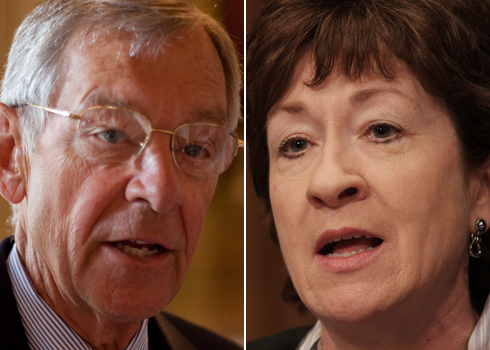The GOP’s bid to block debate on Democrats’ financial regulatory reform bill ended with a whimper. After a three day standoff–during which they voted repeatedly, and to a number, to sustain their filibuster–the Republicans acknowledged that they’d be unable to extract further concessions behind closed doors, and agreed, unanimously, to allow the bill to come to the floor.
That decision didn’t please everybody. In a statement announcing that bipartisan negotiations had reached an impasse, Sen. Richard Shelby (R-AL)–the ranking member on the Banking Committee, and the Republicans’ top financial reform negotiator–said that the common ground he’d found with Democrats was “not sufficient to garner my support for moving this bill to the Senate floor.” And last night, after a meeting of the GOP caucus, Sen. Tom Coburn (R-OK) told reporters that he planned to vote against proceeding to debate again…but he never got the chance.
So who was pushing for the filibuster to end–and why?
A senior Republican aide, granted anonymity to highlight divisions in the caucus, characterized it this way: Republicans held together pretty tightly, but some were, let’s say, more relieved than others to see the the filibuster come to an end.
“Voinovich and Collins,” the aide said. “They were looking for a demarcation line of…we’re still looking for a deal, or no deal was possible.”
There were others, too. Sen. Olympia Snowe (R-ME) had been saying for a week that she’d ultimately move to the next step if Shelby couldn’t cut a deal. And Sen. Bob Corker (R-TN) was furious at his own leadership (and, he said, the Democrats) for mischaracterizing the debate, and making the issue so political. But Collins was ultimately more eager to get on with it than they were, and Voinovich more so than Collins.
“Voinovich is hard to get a handle on,” the aide said. Voinovich has voted with Dems several times on key issues, including, recently, a package of unemployment benefit extenders. “That’s particularly strange because he entered the Senate as a deficit hawk,” the aide said. (Voinovich is retiring at the end of this year, and is therefore less susceptible to pressure from party leadership, and unencumbered by the threat of a primary challenger.)
With Collins, the calculus was rooted in politics back home. “Maine’s different from Texas,” the aide said.
Republicans insist that pressing for further negotiations between Shelby and Senate Banking Committee chairman Chris Dodd won them major concessions. In the end, though, what they got was fairly trivial: Most notably, Dodd agreed to remove a $50 billion, industry-fueled fund to help unwind large failed financial companies. Republican leaders had dubiously charged that the fund would institutionalize tax-payer funded bailouts, and touted its removal as a major victory. But the reality–and the impetus for removing the fund–are rather different. First, the provision was co-authored by a Republican Senator–Bob Corker (R-TN). Furthermore, Dodd never really cared how the stop-gap fund was financed or structured, and the Obama administration opposed erecting the fund altogether.
It was likely doomed before Republicans began their filibuster…but its removal gave them cover to end it.










